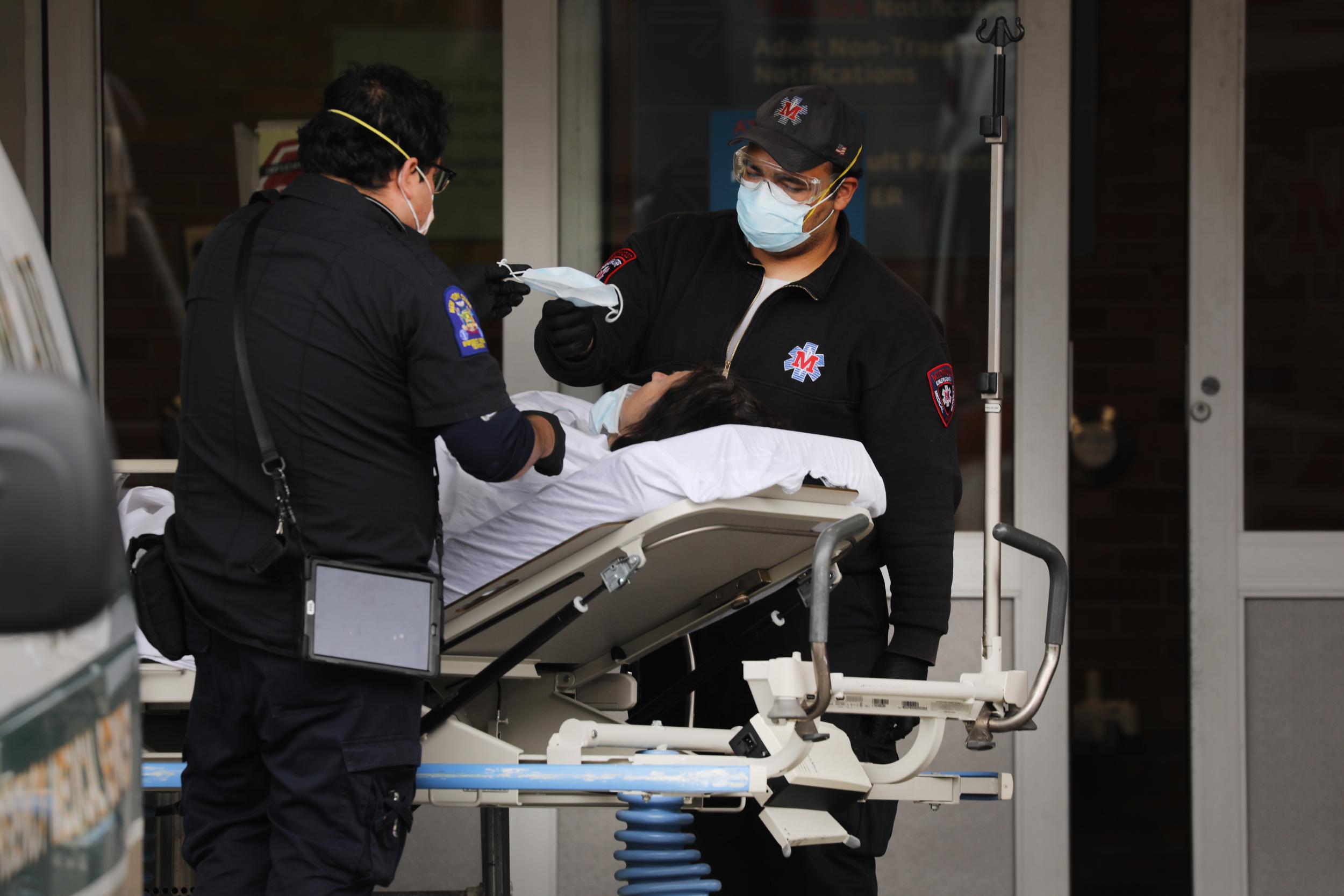This website uses cookies so that we can provide you with the best user experience possible. Cookie information is stored in your browser and performs functions such as recognising you when you return to our website and helping our team to understand which sections of the website you find most interesting and useful.

The doctors and nurses on the frontline of the coronavirus outbreak in New York are waging a battle they did not choose to fight. The tragedy came to them, arriving abruptly in their workplace and turning their lives upside down.
But there are some who ran towards the fight. They chose to leave their families behind to volunteer in overwhelmed hospitals at the epicentre of the global pandemic, and in doing so put themselves in harm’s way.
“I’m terrified of catching it, absolutely,” says Dr Gretchen Winter, 37, who came from Birmingham, Alabama to volunteer. “But I was scared in Alabama, too. I’m scared everywhere that I’m going to catch it. That’s not a reason not to help.”
Dr Winter is among some 4,000 volunteer doctors from across the country who have flooded into New York in the past few weeks to treat coronavirus patients. They are very much in need: More than 17,000 people have lost their lives to the deadly disease across New York state. Although the rate of infections are slowing, it is still seeing around 1,000 new hospitalisations and more than 300 deaths a day.
The volunteers live a Spartan-like existence, thousands of miles from home. Every day they file out from the hotels in Manhattan that have become their temporary homes and spread out across the city to the intensive care units and emergency wards.
“When I’m not at work, I’m in my hotel room alone,” says Dr Winter. “I go home, do a decontamination process, take off my masks and clothes. Then I shower, order delivery, do a little workout, eat dinner and go to bed.”
Speaking to The Independent after her first week on the New York frontline, Dr Winter describes a hospital system that is still struggling, even as the city has managed to make some progress.
“The patients are very sick. Most are on some form of life support. Some people are on more than one form of life support. It’s well above capacity,” she says.
Her day job prepared her well for this crisis. Dr Winter works as a pulmonary and critical care physician at the University of Alabama in Birmingham. She was already treating coronavirus patients there, but saw colleagues struggling in New York and wanted to help. In February, hospitals in the city were sending out calls for volunteers to medical professionals across the US.
She decided to go to help patients, but also because she wanted to provide some relief to those doctors and nurses who have been fighting the outbreak for months.
“The doctors who live here have been working overtime for forever trying to take care of this and they're just completely exhausted,” she says. “I want to give them some time to rest and recuperate.”
Many of the volunteers are unpaid for their work. They have to deal with the stress and danger of treating coronavirus patients during the day, and the isolation that comes with working so far from family and friends in the evening.
“Honestly, the hardest part for me isn’t the medicine — I can do that no matter where I am. It has been being alone in that hotel room at night,” she says.
“Normally at home, when I finish in the ICU, I go home and I have my piano to play and I can spend time with my loved ones. It adds stress to an already stressful job. You don’t have that support system.”
According to some estimates, more than 30 healthcare workers have died in New York since the outbreak began. The volunteer doctors and nurses, like all those working on the frontlines of the coronavirus, have had to make some sobering decisions since putting themselves in the firing line.
“All the healthcare professionals I know are making wills and sorting out our life insurance,” says Dr Winter. “We’re preparing for the worst because healthcare workers, nurses, doctors, sanitation workers are dying at an alarming rate from this disease.”
One of the biggest issues for medical staff in New York during the worst days of the crisis was a lack of protective equipment for frontline staff. Many doctors and nurses reported having to reuse face masks — which put them at greater risk of infection.
Dr Winter says the dangers that come with treating coronavirus patients is different from anything else.
“We didn't sign up to be heroes. You know, cops sign up to work in dangerous conditions. Firefighters sign up to work in dangerous conditions. Soldiers sign up to work in those conditions knowing that they are putting their lives on the line. And those people are heroes. But health care workers, we don't sign up to be a doctor thinking that our lives will be on the line,” she says.
“Because of the seriousness of this virus, we are now facing the dilemma of protecting our own health or protecting patients. And most healthcare workers are driven to help others. We are willing to put our own health at risk to care for these patients. But it is a trade-off that most of us wish we didn't have to make.”
But there are some silver linings to the work. On Monday, Dr Winter extubated her first patient, who had been on a ventilator for two weeks. And everything she is going through today, she says, could well serve her and her patients in the future.
“I think dealing with struggle sometimes gives you more strength and compassion. You gain it through those experiences. And I think ultimately it will make me a better doctor and better able to serve my patients.”



 Africana55 Radio
Africana55 Radio 

